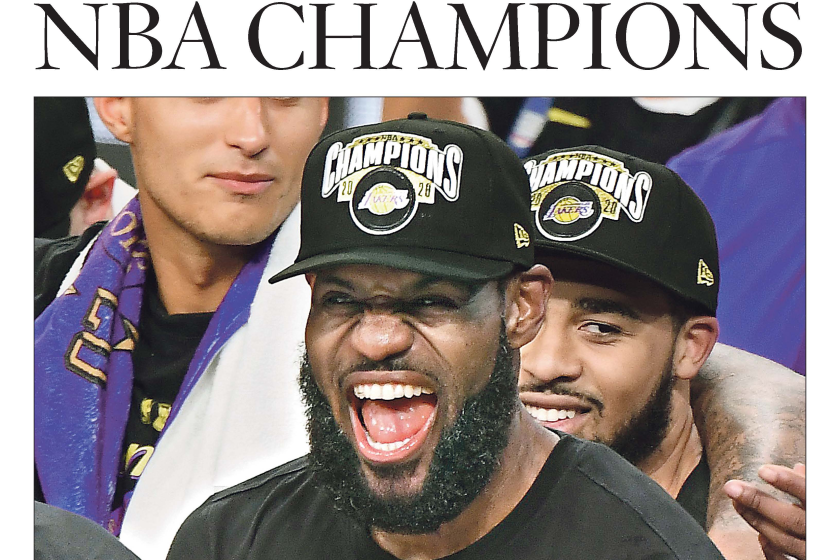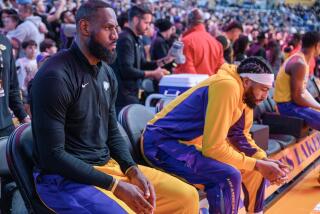How the Lakers won their previous 16 championships
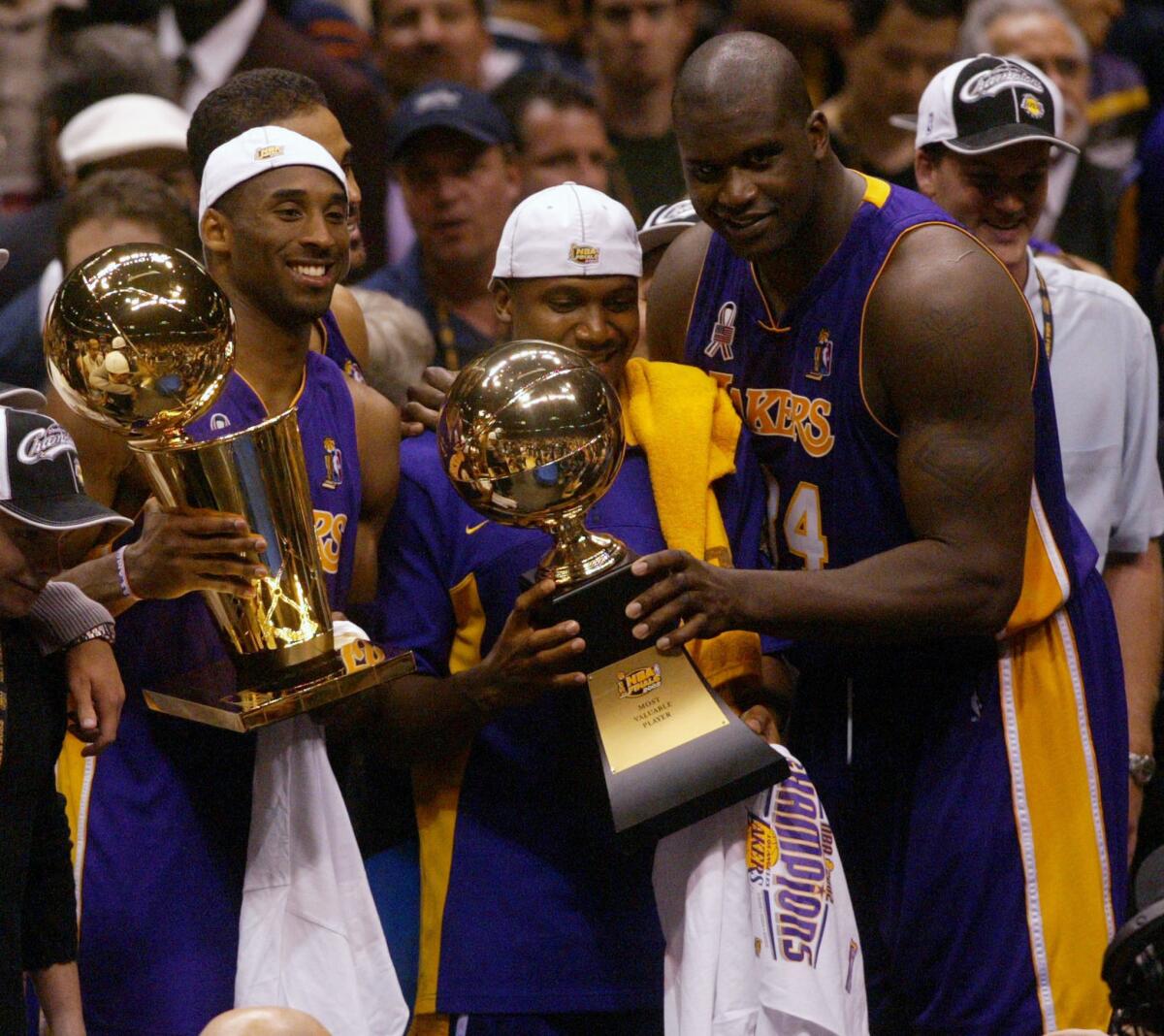
The Los Angeles Lakers won the franchise’s 17th NBA championship to equal the Boston Celtics for most in league history.
A look at the Lakers’ 16 previous NBA championship teams:
1948-49 (44-16)
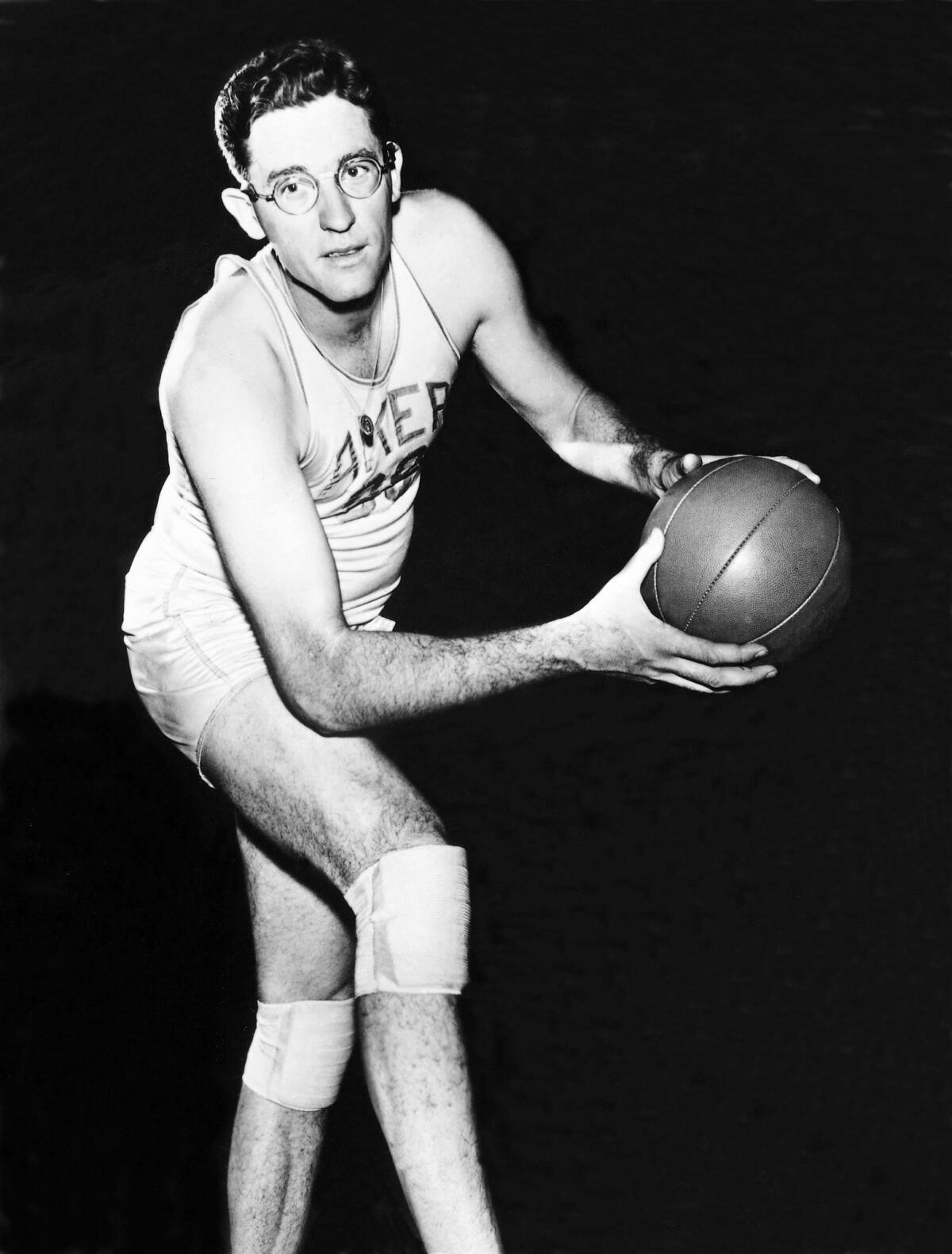
Championship: Minneapolis Lakers 4, Washington Capitols 2
The Team: George Mikan, Jim Pollard, Herm Schaefer, Don Carlson, Arnie Ferrin, Tony Jaros, Jack Swan, Donnie Forman, Whitney Kachan, Mike Bloom, Johnny Jorgensen, Earl Gardner, Jack Tingle, Don Smith, Ray Ellefson
Coach: John Kundla
The Season: As the National Basketball League and Basketball Association of America merged to become the NBA, the Lakers had the good fortune of landing George Mikan, formerly of the disbanded Chicago American Gears. At 6-10 and 245 pounds, Mikan was dominant, averaging 28.3 points and 3.6 assists per game. The Lakers finished one game behind Rochester in the West, but easily defeated the Royals in the playoffs.
Western Division Semifinals: Defeated Chicago Stags 2-0
Western Division Finals: Defeated Rochester Royals 2-0
Top playoff performances: Mikan, 30.3 ppg; Pollard 13.0 ppg, 3.9 apg; Schaefer 12.4 ppg
1949-50 (51-17)
Championship: Minneapolis Lakers 4, Syracuse Nationals 2
The Team: George Mikan, Jim Pollard, Vern Mikkelsen, Arnie Ferrin, Herm Schaefer, Don Carlson, Bob Harrison, Slater Martin, Tony Jaros, Paul Walther, Gene Stump, Billy Hassett, Bud Grant, Normie Glick
Coach: John Kundla
The Season: In the first official season of the NBA, the Lakers continued to be a force because of Mikan. He averaged 27.4 points per game in the regular season, one of just two players to average above 20. Vern Mikkelsen began to show his value as well, with 14.1 points per game. This team showed that the Lakers were becoming the NBA’s first dynasty.
Central Division Semifinals: Defeated Chicago Stags 2-0
Central Division Finals: Defeated Fort Wayne Pistons 2-0
NBA Semifinals: Defeated Anderson Packers 2-0
Top playoff performances: Mikan 31.3 ppg, 3.0 apg; Mikkelsen 13.0 ppg; Pollard 12.0 ppg, 4.7 apg
1951-52 (40-26)
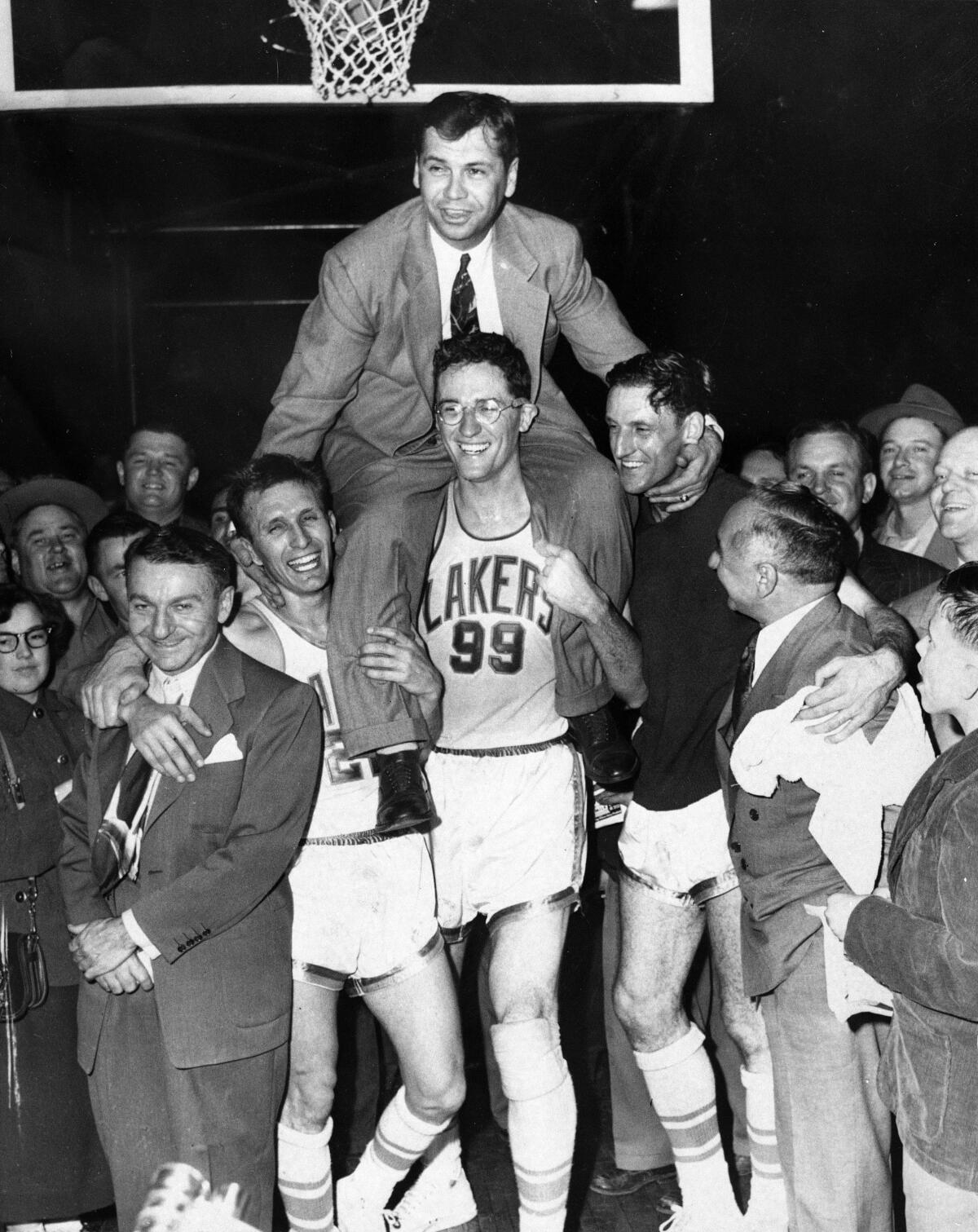
Championship: Minneapolis Lakers 4, New York Knicks 3
The Team: George Mikan, Jim Pollard, Vern Mikkelsen, Slater Martin, Whitey Skoog, Bob Harrison, Howie Schultz, Lew Hitch, Joe Hutton, John Pilch, Pep Saul
Coach: John Kundla
The Season: The NBA widened the foul lane prior this season in hopes of slowing down Mikan, but he still averaged 23.8 points per game. He was also tops in a new statistic, rebounds, with 13.5 per game. Mikkelsen and Pollard excelled there too, with 10.3 and 9.1 rebounds per game, respectively. The Knicks provided a challenge in the Finals, forcing the Lakers’ first Game 7.
Western Division Semifinals: Defeated the Indianapolis Olympians 2-0
Western Division Finals: Defeated the Rochester Royals 3-1
Top playoff performances: Mikan 23.6 ppg, 15.9 rpg; Pollard 16.1 ppg, 6.5 rpg; Mikkelsen 13.3 ppg, 8.5 rpg; Martin 4.3 apg
1952-53 (48-22)
Championship: Minneapolis Lakers 4, New York Knicks 1
The Team: George Mikan, Vern Mikkelsen, Jim Pollard, Slater Martin, Pep Saul, Bob Harrison, Jim Holstein, Lew Hitch, Whitey Skoog, Howie Schultz
Coach: John Kundla
The Season: With essentially the same lineup as its championship team the year before, the Lakers finished first in the West. Though Mikan’s numbers (20.6 ppg) were lower, Mikkelsen and Pollard picked up the slack. Minneapolis was 7-0 against Fort Wayne in the regular season, but nearly slipped against the Pistons in the division finals. They beat the Knicks with an average margin of victory of just 6.5 points.
Western Division Semifinals: Defeated Indianapolis Olympians 2-0
Western Division Finals: Defeated Fort Wayne Pistons 3-2
Top playoff performances: Mikan 19.8 ppg, 15.4 rpg; Pollard 14.3 ppg, 7.2 rpg, 4.1 apg; Mikkelsen 12.0 ppg, 8.7 rpg
1953-54 (56-26)
Championship: Minneapolis Lakers 4, Syracuse Nationals 3
The Team: George Mikan, Jim Pollard, Vern Mikkelsen, Slater Martin, Clyde Lovellette, Whitey Skoog, Pep Saul, Dick Schnittker, Jim Holstein, Jim Fritsche, Bob Harrison
Coach: John Kundla
The Season: The fifth championship season in six years for the Lakers was the last for Coach John Kundla and for Mikan. The addition of rookie Clyde Lovellette helped to ease the dependence on Mikan, who struggled with knee problems. The duo helped the team become the first NBA team to win three consecutive titles. Mikan announced his retirement after the season and became the team’s general manager.
Western Division Semifinals: In a Round Robin-style playoff between the three best teams in the Western Division, the Lakers defeated the Rochester Royals and won two games against the Fort Wayne Pistons.
Western Division Finals: Defeated the Rochester Royals 2-1
Top playoff performances: Mikan 19.4 ppg, 13.2 rpg; Pollard 12.3 ppg, 8.5 rpg; Lovellette 10.5 ppg, 9.7 rpg; Martin 4.6 apg
1971-72 (69-13)
Championship: Los Angeles Lakers 4, New York Knicks 1
The Team: Gail Goodrich, Jerry West, Jim McMillian, Wilt Chamberlain, Happy Hairston, Elgin Baylor, Flynn Robinson, Pat Riley, Keith Erickson, John Trapp, Leroy Ellis, Jim Cleamons
Coach: Bill Sharman
The Season: In the first championship season since their move to Los Angeles 11 years before, the Lakers set a record with 69 regular-season wins, which would not be broken for 24 seasons. On Nov. 5, 1971, the Lakers beat the Baltimore Bullets to begin a 33-game win streak which did not end until Jan. 9, 1972. The mark still stands as the longest winning streak in NBA history.
Western Conference Semifinals: Defeated the Chicago Bulls 4-0
Western Conference Finals: Defeated Milwaukee Bucks 4-2
Top playoff performances: Goodrich, 23.8 ppg; West, 22.9 ppg, 8.9 apg; Chamberlain 14.7 ppg, 21.0 rpg; Hairston 13.5 ppg, 13.1 rpg
1979-80 (60-22)
Championship: Los Angeles Lakers 4, Philadelphia 76ers 2
The Team: Kareem Abdul-Jabbar, Jamaal Wilkes, Magic Johnson, Norm Nixon, Jim Chones, Spencer Haywood, Michael Cooper, Mark Landsberger, Ron Boone, Kenny Carr, Don Ford, Brad Holland, Marty Byrnes, Ollie Mack, Butch Lee
Coach: Jack McKinney/Paul Westhead
The Season: “ Showtime” began as 20-year old rookie Magic Johnson inspired this talented team to first place in the Pacific Division and the Lakers began to establish themselves as a dynasty once again. After four close games in the Finals, Abdul-Jabbar turned in a 40-point performance in Game 5 despite spraining his ankle. With Abdul-Jabbar out, Johnson stepped up in Game 6, his 42 points and 15 rebounds leading the Lakers.
Western Conference Semifinals: Defeated the Phoenix Suns 4-1
Western Conference Finals: Defeated the Seattle Supersonics 4-1
Top playoff performances: Abdul-Jabbar, 31.9 ppg, 12.1 rpg; Johnson 18.3 ppg, 10.5 rpg, 9.4 apg; Wilkes 20.3 ppg, 8.0 rpg; Nixon 16.9 ppg, 7.8 apg
1981-82 (57-25)
Championship: Los Angeles Lakers 4, Philadelphia 76ers 2
The Team: Kareem Abdul-Jabbar, Jamaal Wilkes, Magic Johnson, Norm Nixon, Mitch Kupchak, Michael Cooper, Bob McAdoo, Mike McGee, Kurt Rambis, Mark Landsberger, Eddie Jordan, Clay Johnson, Jim Brewer, Kevin McKenna
Coach: Paul Westhead/Pat Riley
The Season: The Lakers came into the season looking to avenge a surprising loss to Houston in the first round of the 1981 playoffs. With Johnson back from a knee injury and the additions of coach Pat Riley and sixth man Bob McAdoo, the Lakers swept Phoenix and San Antonio with an average margin of victory of 11 points and finished with a playoff record of 12-2.
Western Conference Semifinals: Defeated the Phoenix Suns 4-0
Western Conference Finals: Defeated the San Antonio Spurs 4-0
Top playoff performances: Johnson 17.4 ppg, 11.3 rpg, 9.3 apg; Abdul-Jabbar 20.4 ppg, 8.5 rpg; Nixon 20.4 ppg, 8.1 apg; Wilkes 20.0 ppg
1984-85 (62-20)
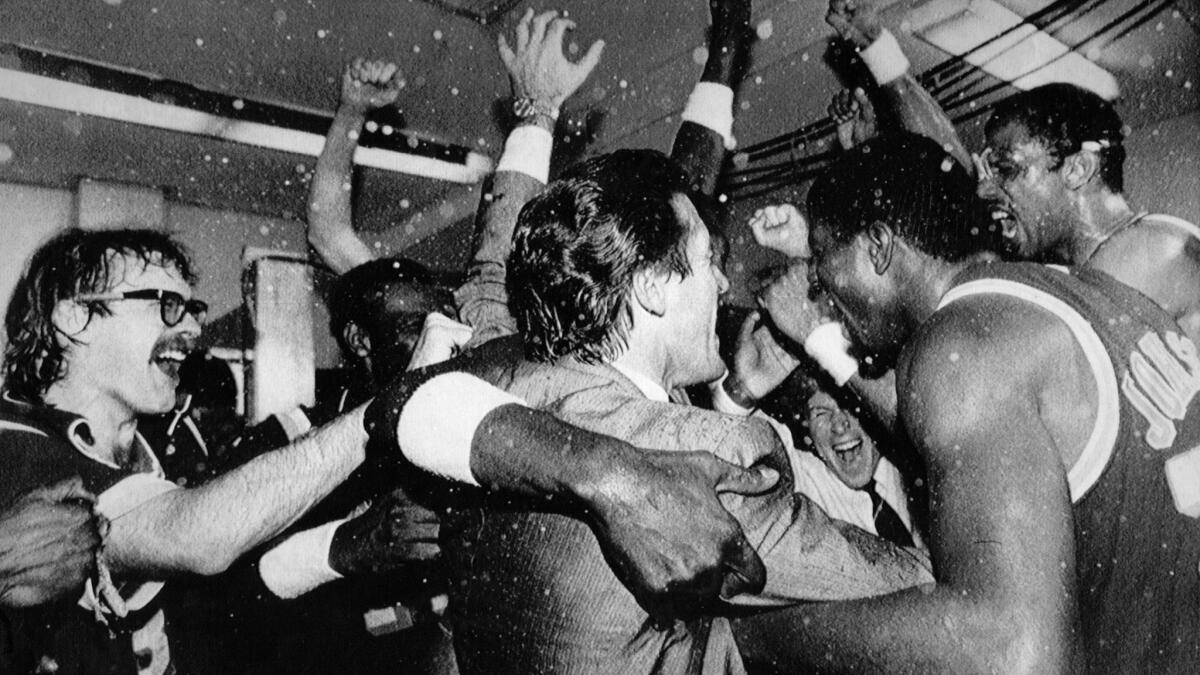
Championship: Los Angeles Lakers 4, Boston Celtics 2
The Team: Magic Johnson, Kareem Abdul-Jabbar, James Worthy, Kurt Rambis, Byron Scott, Michael Cooper, Jamaal Wilkes, Ronnie Lester, Larry Spriggs, Mike McGee, Mitch Kupchak, Bob McAdoo, Chuck Nevitt, Earl Jones
The Coach: Pat Riley
The Season: Johnson’s 13.3 assists per game fueled “Showtime” and resulted in the 22.7 and 16.1 ppg averages of Abdul-Jabbar and Worthy. A year removed from yet another loss to Boston in the Finals, the Lakers looked set to avenge. After a brutal 148-114 loss in Game 1, known as the “Memorial Day Massacre,” Los Angeles came back to defeat Boston in the Finals for the first time.
Western Conference Semifinals: Defeated the Portland Trail Blazers 4-1
Western Conference Finals: Defeated the Denver Nuggets 4-1
Top playoff performances: Johnson, 17.5 ppg, 15.2 apg; Abdul-Jabbar, 21.9 ppg, 8.1 rpg; Worthy, 21.5 ppg, 5.1 rpg
1986-87 (65-17)
Championship: Los Angeles Lakers 4, Boston Celtics 2
The Team: Magic Johnson, Kareem Abdul-Jabbar, James Worthy, Kurt Rambis, Byron Scott, Wes Matthews, Michael Cooper, A.C. Green, Mychal Thompson, Adrian Branch, Billy Thompson, Frank Brickowski, Mike Smrek
The Coach: Pat Riley
The Season: Following one of only two seasons in which they didn’t make the NBA Finals in the ‘80s, the Lakers won 65 games and continued to dominate in the playoffs. The Lakers went 11-1 to reach the championship. Johnson took his place on top of the team, leading in points (23.9), assists (12.2) and steals (1.7) per game. He was named regular season and Finals MVP.
Western Conference Semifinals: Defeated the Golden State Warriors 4-1
Western Conference Finals: Defeated the Seattle Sonics 4-0
Top playoff performances: Worthy, 23.6 ppg, 5.6 rpg; Johnson, 21.8 ppg, 12.2 apg, 7.4 rpg; Abdul-Jabar, 19.2 ppg, 6.8 rpg.
1987-88 (62-20)
Championship: Los Angeles Lakers 4, Detroit Pistons 3
The Team: Magic Johnson, James Worthy, Kurt Rambis, Byron Scott, Jeff Lamp, Milt Wagner, Wes Matthews, Michael Cooper, A.C. Green, Billy Thompson, Ray Tolbert, Tony Campbell, Mychal Thompson, Kareem Abdul-Jabbar, Mike Smrek
The Coach: Pat Riley
The Season: As Abdul-Jabbar began to age, Worthy and Scott stepped up their scoring. The two combined to average 38 points on the season. Johnson helped to boost that total with an average of 11.9 assists during the regular season. The defeat of the Detroit Pistons gave the Lakers their first back-to-back NBA titles since the Minneapolis team won three straight in the 1950s.
Western Conference Semifinals: Defeated the Utah Jazz 4-3
Western Conference Finals: Defeated the Dallas Mavericks 4-3
Top playoff performances: Johnson, 19.9 ppg, 12.6 apg; Worthy, 21.1 ppg, 5.8 rpg; Scott, 19.6 ppg, 4.2 rpg
1999-2000 (67-15)
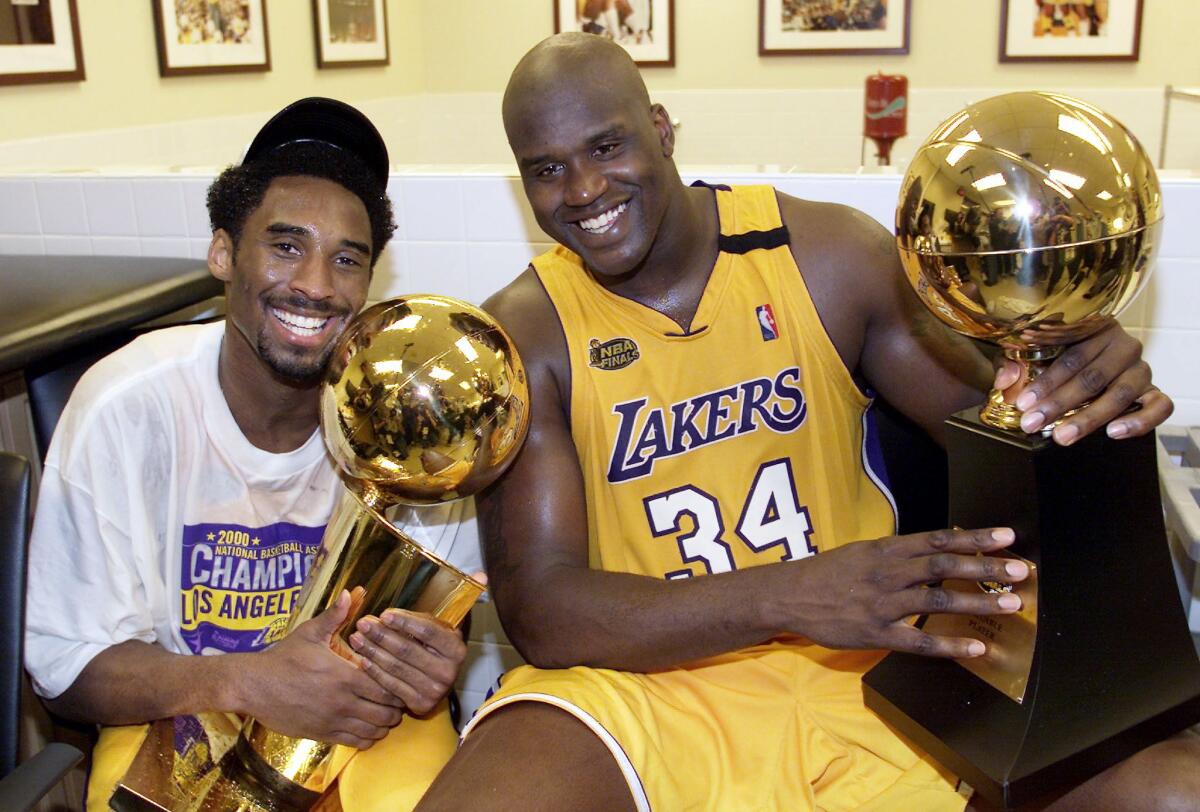
Championship: Los Angeles Lakers 4, Indiana Pacers 2
The Team: Shaquille O’Neal, Kobe Bryant, Robert Horry, A.C. Green, Glen Rice, Ron Harper, Rick Fox, Derek Fisher, Travis Knight, Brian Shaw, Devean George, John Sally, Tyronn Lue, John Celestand
The Coach: Phil Jackson
The Season: Three seasons after signing with the Lakers as a free agent, O’Neal delivered the first of his three championships. He averaged 30.7 points and 15.4 rebounds en route to the title. Bryant chipped in 21.8 points, and Jackson took home his seventh NBA coaching title. The Lakers led the Western Conference with a 67-15 regular season record and finished the playoffs with a 15-8 mark.
Western Conference first round: Defeated the Sacramento Kings 3-2
Western Conference Semifinals: Defeated the Phoenix Suns 4-1
Western Conference Finals: Defeated the Portland Trail Blazers 4-3
Top playoff performances: O’Neal, 30.7 ppg, 15.4 rpg; Bryant, 21.1 ppg, 4.5 rpg, 4.4 apg; Rice 12.2 ppg
2000-01 (56-26)
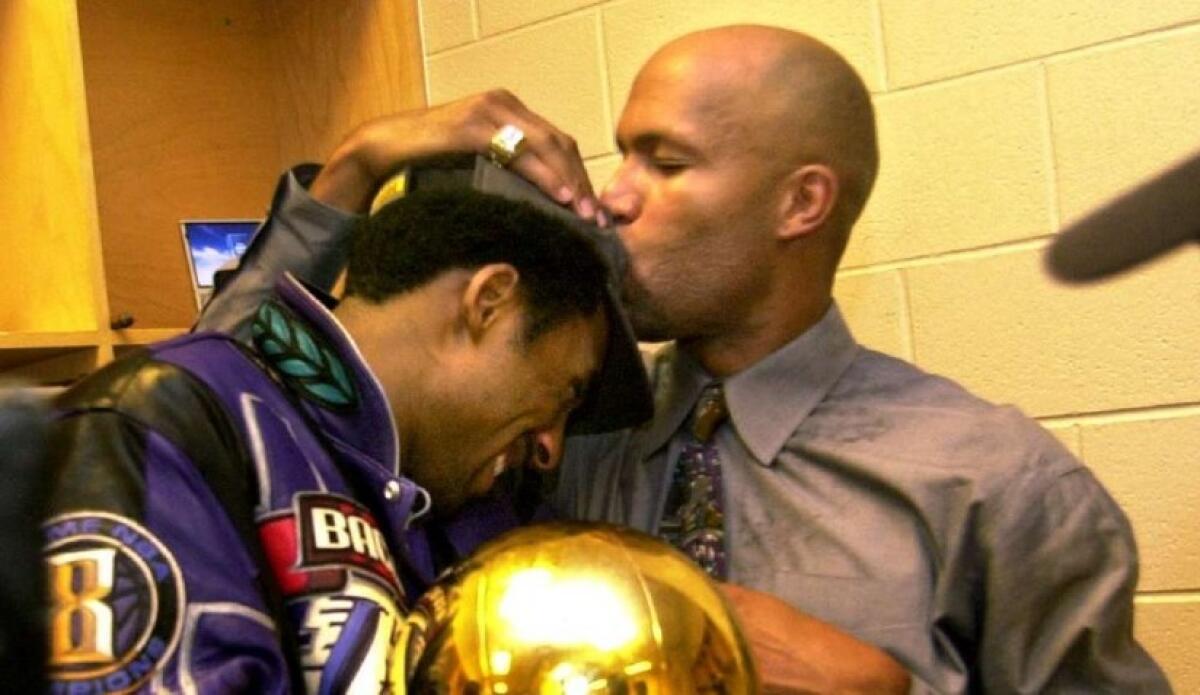
Championship: Los Angeles Lakers 4, Philadelphia 76ers 1
The Team: Shaquille O’Neal, Kobe Bryant, Derek Fisher, Robert Horry, Rick Fox, , Ron Harper Devean George, Horace Grant, Tyronn Lue, Brian Shaw, Mark Madsen, Isiah Rider, Greg Foster, Stanislav Medvedenko, Mike Penberthy
The Coach: Phil Jackson
The Season: The veteran Lakers raced through the regular season. O’Neal led the team in scoring at 29.5 ppg, closely followed by Bryant’s 28.9. The Lakers swept all three rounds of the playoffs to make it to the Finals, where Allen Iverson and the 76ers handed them a Game 1 loss, the only one the Lakers would allow, as they easily won the next four.
Western Conference first round: Defeated the Portland Trail Blazers 3-0
Western Conference Semifinals: Defeated the Sacramento Kings 4-0
Western Conference Finals: Defeated the San Antonio Spurs 4-0
Top playoff performances: O’Neal, 30.4 ppg, 15.4 rpg; Bryant, 29.4 ppg, 7.3 rpg, 6.1 apg; Fisher, 13.4 ppg
2001-02 (58-24)
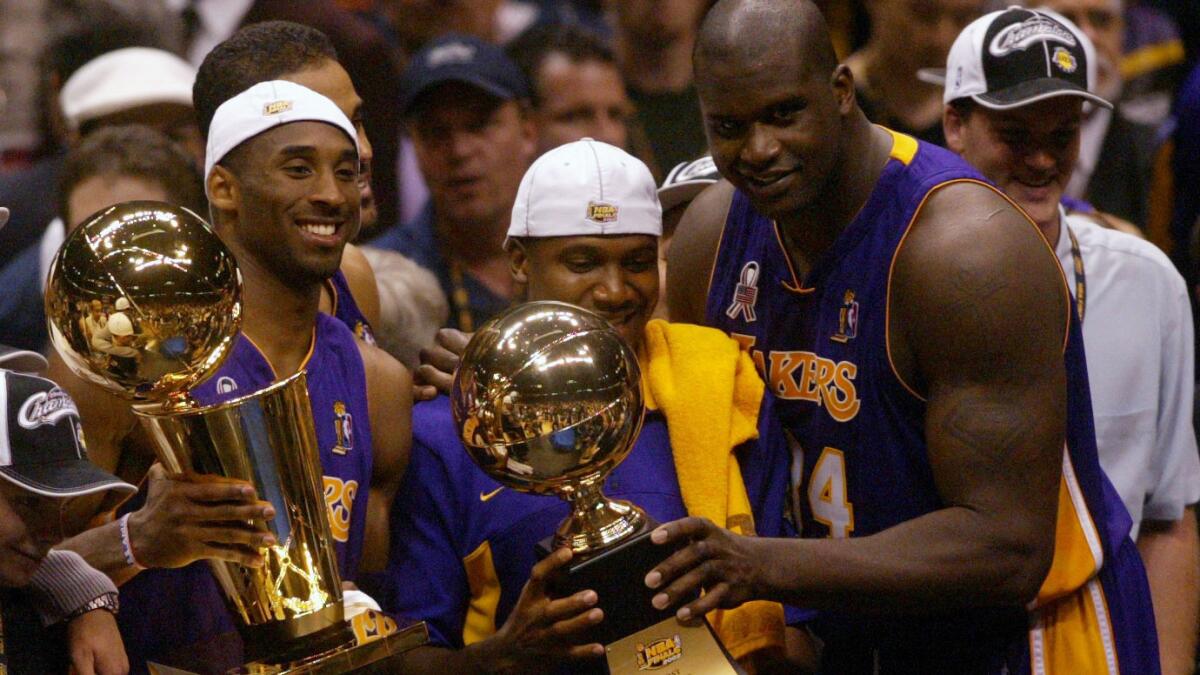
Championship: Los Angeles Lakers 4, New Jersey Nets 0
The Team: Shaquille O’Neal, Kobe Bryant, Derek Fisher, Robert Horry, Rick Fox, Lindsey Hunter, Mitch Richmond, Devean George, Mark Madsen, Brain Shaw, Samaki Walker, Jelani McCoy
The Coach: Phil Jackson
The Season: The Lakers finished third in the Western Conference but defeated both teams holding the one and two slots on the way to the 2002 title. Los Angeles went through San Antonio, 4-1, and Sacramento, 4-3, before sweeping the New Jersey Nets for the league championship. O’Neal and Bryant combined to average 53.6 ppg and lead the Lakers to a 58-24 regular season and 15-4 postseason.
Western Conference first round: Defeated the Portland Trail Blazers 3-0
Western Conference Semifinals: Defeated the San Antonio Spurs 4-1
Western Conference Finals: Defeated the Sacramento Kings 4-3 .
Top playoff performances: O’Neal, 28.5 ppg, 12.6 rpg; Bryant 26.6 ppg, 5.8 rpg, 4.6 apg
2008-09 (65-17)
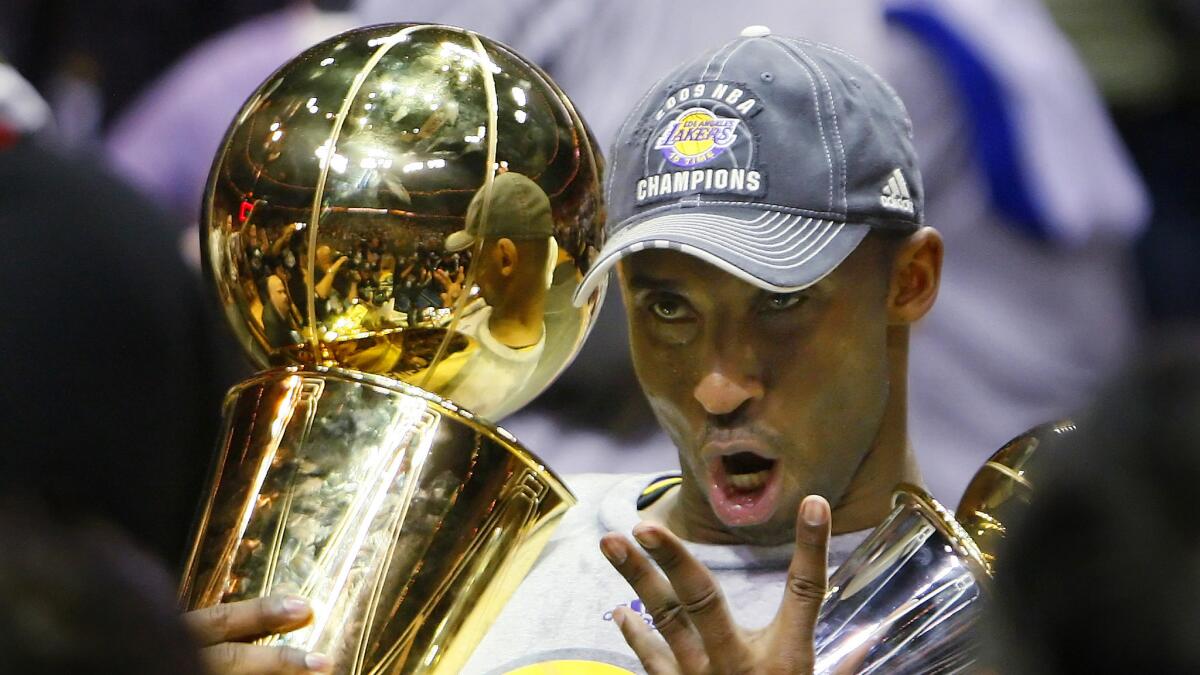
Championship: Los Angeles Lakers 4, Orlando Magic 1
The Team: Kobe Bryant, Pau Gasol, Derek Fisher, Lamar Odom, Trevor Ariza, Andrew Bynum, Jordan Farmar, Sasha Vujacic, Luke Walton, Vladimir Radmanovic, Shannon Brown, D.J. Mbenga, Adam Morrison, Josh Powell, Chris Mihm, Sun Yu
The Coach: Phil Jackson
The Season: After a tumultuous rebuilding process, Bryant won his first championship without Shaquille O’Neal. The Lakers were 65-17, finishing atop the Western Conference. Los Angeles went 16-7 in the playoffs to win the 2009 NBA championship. With the help of newly acquired big men Gasol and Odom, Bryant and Jackson won their fourth championship together. Bryant was named Finals MVP for the first time in his career.
Western Conference first round: Defeated the Utah Jazz 4-1
Western Conference Semifinals: Defeated the Houston Rockets 4-3
Western Conference Finals: Defeated the Denver Nuggets 4-2
Top playoff performances: Bryant, 30.2 ppg, 5.5 apg; Gasol, 18.3 ppg, 10.3 rpg; Odom, 12.3 ppg, 9.1 rpg
2009-2010 (57-25)
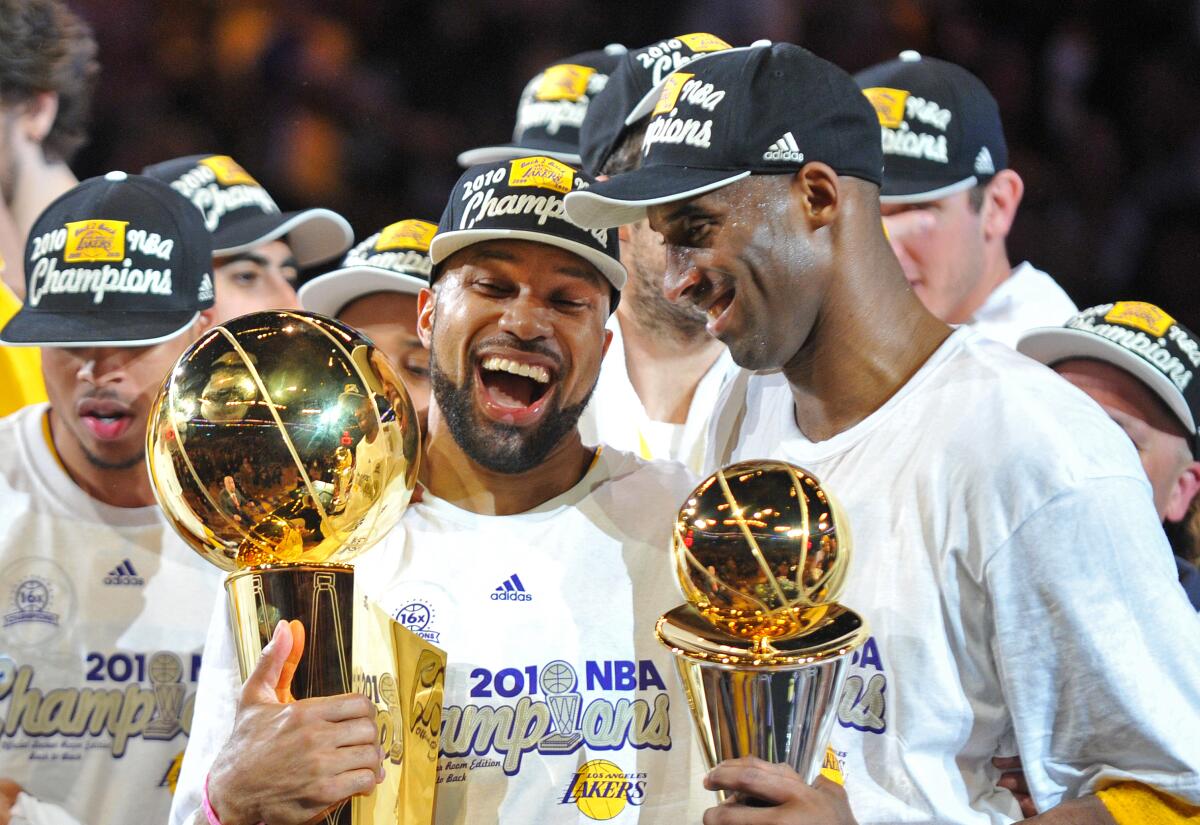
Championship: Los Angeles Lakers 4, Boston Celtics 3
The Team: Kobe Bryant, Pau Gasol, Derek Fisher, Lamar Odom, Ron Artest, Andrew Bynum, Jordan Farmar, Sasha Vujacic, Luke Walton, Shannon Brown, D.J. Mbenga, Adam Morrison, Josh Powell
The Coach: Phil Jackson
The Season: The Lakers had the best record in the Western Conference at 57-25, and made it to the finals for the third straight season. Los Angeles acquired Ron Artest to add toughness to a team full of height and talent. Though sometimes confused and often times confusing to teammates and coaches, Artest meshed with a core that still included Bryant, Gasol and Odom.
Western Conference Semifinals: Defeated the Utah Jazz 4-0
Western Conference Finals: Defeated the Phoenix Suns 4-2
Top playoff performances: Bryant, 29.2 ppg 6.0 rpg, 5.5 apg; Gasol, 19.6 ppg, 11.1 rpg; Artest, 11.2 ppg
Coming Wednesday: The Los Angeles Times will publish a special section commemorating the Lakers’ 2020 NBA championship.
More to Read
Go beyond the scoreboard
Get the latest on L.A.'s teams in the daily Sports Report newsletter.
You may occasionally receive promotional content from the Los Angeles Times.
